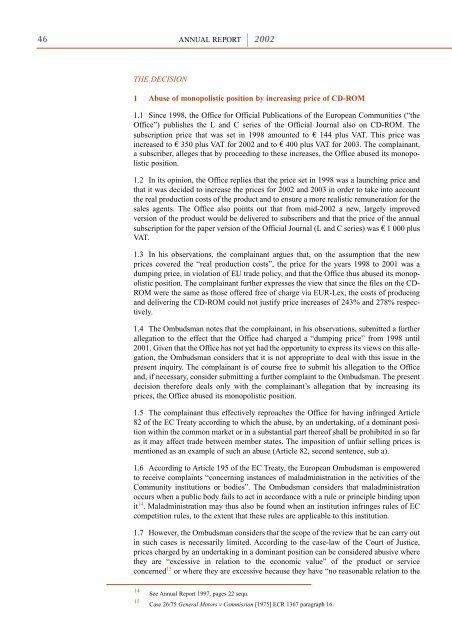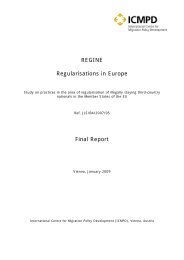Annual report 2002 - EOI
Annual report 2002 - EOI
Annual report 2002 - EOI
You also want an ePaper? Increase the reach of your titles
YUMPU automatically turns print PDFs into web optimized ePapers that Google loves.
46 ANNUAL REPORT | <strong>2002</strong><br />
THE DECISION<br />
1 Abuse of monopolistic position by increasing price of CD-ROM<br />
1.1 Since 1998, the Office for Official Publications of the European Communities (“the<br />
Office”) publishes the L and C series of the Official Journal also on CD-ROM. The<br />
subscription price that was set in 1998 amounted to € 144 plus VAT. This price was<br />
increased to € 350 plus VAT for <strong>2002</strong> and to € 400 plus VAT for 2003. The complainant,<br />
a subscriber, alleges that by proceeding to these increases, the Office abused its monopolistic<br />
position.<br />
1.2 In its opinion, the Office replies that the price set in 1998 was a launching price and<br />
that it was decided to increase the prices for <strong>2002</strong> and 2003 in order to take into account<br />
the real production costs of the product and to ensure a more realistic remuneration for the<br />
sales agents. The Office also points out that from mid-<strong>2002</strong> a new, largely improved<br />
version of the product would be delivered to subscribers and that the price of the annual<br />
subscription for the paper version of the Official Journal (L and C series) was € 1 000 plus<br />
VAT.<br />
1.3 In his observations, the complainant argues that, on the assumption that the new<br />
prices covered the “real production costs”, the price for the years 1998 to 2001 was a<br />
dumping price, in violation of EU trade policy, and that the Office thus abused its monopolistic<br />
position. The complainant further expresses the view that since the files on the CD-<br />
ROM were the same as those offered free of charge via EUR-Lex, the costs of producing<br />
and delivering the CD-ROM could not justify price increases of 243% and 278% respectively.<br />
1.4 The Ombudsman notes that the complainant, in his observations, submitted a further<br />
allegation to the effect that the Office had charged a “dumping price” from 1998 until<br />
2001. Given that the Office has not yet had the opportunity to express its views on this allegation,<br />
the Ombudsman considers that it is not appropriate to deal with this issue in the<br />
present inquiry. The complainant is of course free to submit his allegation to the Office<br />
and, if necessary, consider submitting a further complaint to the Ombudsman. The present<br />
decision therefore deals only with the complainant’s allegation that by increasing its<br />
prices, the Office abused its monopolistic position.<br />
1.5 The complainant thus effectively reproaches the Office for having infringed Article<br />
82 of the EC Treaty according to which the abuse, by an undertaking, of a dominant position<br />
within the common market or in a substantial part thereof shall be prohibited in so far<br />
as it may affect trade between member states. The imposition of unfair selling prices is<br />
mentioned as an example of such an abuse (Article 82, second sentence, sub a).<br />
1.6 According to Article 195 of the EC Treaty, the European Ombudsman is empowered<br />
to receive complaints “concerning instances of maladministration in the activities of the<br />
Community institutions or bodies”. The Ombudsman considers that maladministration<br />
occurs when a public body fails to act in accordance with a rule or principle binding upon<br />
it 14 . Maladministration may thus also be found when an institution infringes rules of EC<br />
competition rules, to the extent that these rules are applicable to this institution.<br />
1.7 However, the Ombudsman considers that the scope of the review that he can carry out<br />
in such cases is necessarily limited. According to the case-law of the Court of Justice,<br />
prices charged by an undertaking in a dominant position can be considered abusive where<br />
they are “excessive in relation to the economic value” of the product or service<br />
concerned 15 or where they are excessive because they have “no reasonable relation to the<br />
14<br />
15<br />
See <strong>Annual</strong> Report 1997, pages 22 sequ.<br />
Case 26/75 General Motors v Commission [1975] ECR 1367 paragraph 16.
















